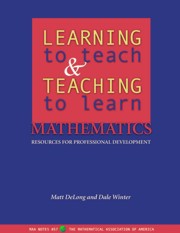Book contents
- Frontmatter
- Preface
- Contents
- 1 The Professional Development Program
- 2 How to Use this Book
- 3 An Orientation Session for the Beginning of the Semester
- 4 Making In-class Groups Work
- 5 Getting Students to Read the Textbook
- 6 Assessing and Evaluating Students' Work
- 7 Managing Homework Teams
- 8 Teaching During Office Hours
- 9 Establishing and Maintaining Control in Your Classroom
- 10 Proctoring Tests and Examinations
- 11 Teaching with Calculators and Computers
- 12 Making Lesson Plans
- 13 Strategies for Motivating Students
- 14 Dealing With Difficult Instructor-Student Situations
- 15 End-of-Semester Administration
- 16 Adapting Materials and Designing Your Own Meetings
- 17 Classroom Visits
- A Tips for Running Meetings
- B The Michigan Introductory Program
- Bibliography
15 - End-of-Semester Administration
- Frontmatter
- Preface
- Contents
- 1 The Professional Development Program
- 2 How to Use this Book
- 3 An Orientation Session for the Beginning of the Semester
- 4 Making In-class Groups Work
- 5 Getting Students to Read the Textbook
- 6 Assessing and Evaluating Students' Work
- 7 Managing Homework Teams
- 8 Teaching During Office Hours
- 9 Establishing and Maintaining Control in Your Classroom
- 10 Proctoring Tests and Examinations
- 11 Teaching with Calculators and Computers
- 12 Making Lesson Plans
- 13 Strategies for Motivating Students
- 14 Dealing With Difficult Instructor-Student Situations
- 15 End-of-Semester Administration
- 16 Adapting Materials and Designing Your Own Meetings
- 17 Classroom Visits
- A Tips for Running Meetings
- B The Michigan Introductory Program
- Bibliography
Summary
By the end of their first semester of teaching, new instructors should have become somewhat comfortable with the day-to-day issues of planning their lessons, meeting students in office hours, grading homework, etc. Unfortunately, the end of the semester brings new and different stresses and struggles. The traditional pressure of grades places added importance to the students on mastering new and old material. In addition it provides temptation for students to cheat during the final exam or to bargain (or beg!) for grade changes after the exam. New instructors may be caught unaware by some of these issues. This meeting is intended to preempt some of these difficulties by conveying institutional guidelines as well as providing practical and moral support for dealing with these issues. It is also a forum for conveying administrative information, such as how to schedule a review session, what is expected of instructors on exam day, how to calculate final grades, and any post-semester responsibilities the instructors may have.
Description and Purpose of the Meeting
This meeting is intended to be a thirty to fifty minute session. The meeting is intended to be a venue for distributing information, and for communicating to instructors an unequivocal statement of responsibility. It is not necessary for experienced instructors to attend such a meeting, although these instructors are an invaluable resource for the meeting leader. This meeting is primarily targeted at those instructors who are new to teaching in your department.
- Type
- Chapter
- Information
- Learning to Teach and Teaching to Learn MathematicsResources for Professional Development, pp. 183 - 196Publisher: Mathematical Association of AmericaPrint publication year: 2002

